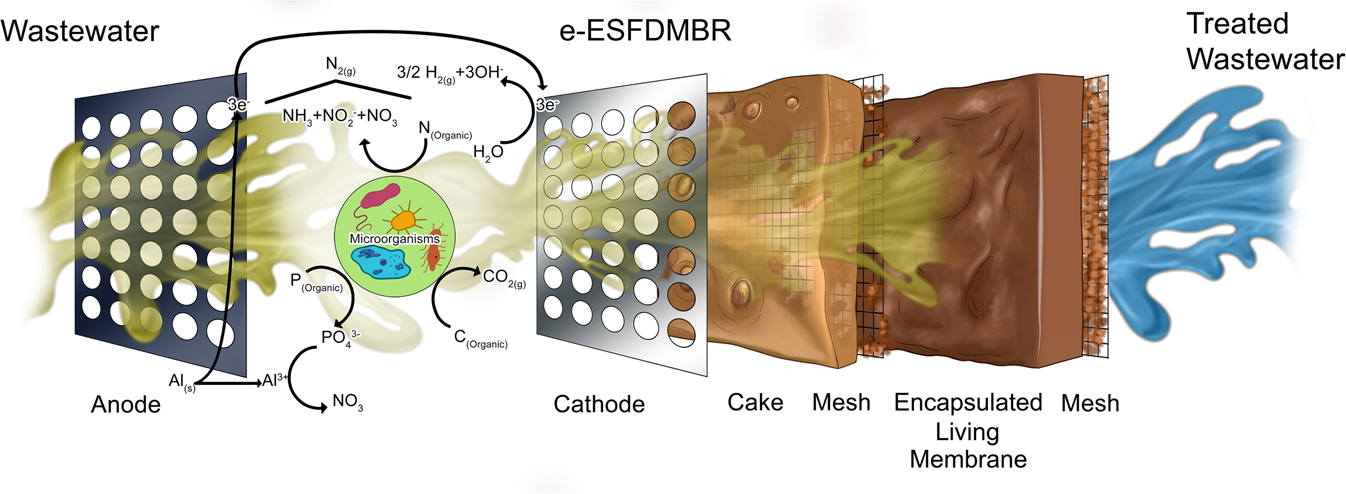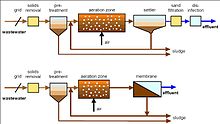The Science Behind Membrane Bioreactor: How It Works and Why It’s Effective
Membrane Bioreactors Described: Efficient Solutions for Tidy Water
Membrane bioreactors (MBRs) have actually emerged as an innovative remedy for addressing the pushing obstacles of wastewater treatment - Membrane Bioreactor. By incorporating biological processes with innovative membrane layer filtering, MBRs not only enhance the top quality of cured water however also lower the spatial needs of treatment facilities.

What Are Membrane Bioreactors?
Membrane bioreactors (MBRs) are innovative wastewater therapy systems that integrate biological destruction procedures with membrane purification modern technology. This assimilation enables the reliable removal of contaminants from water, making MBRs a preferred selection in different applications, including metropolitan wastewater therapy and industrial effluent monitoring.

One of the critical benefits of MBRs is their ability to generate top notch effluent, frequently ideal for reuse in irrigation or commercial processes. In addition, MBRs need a smaller sized impact contrasted to conventional therapy systems, making them optimal for city setups where space may be limited.
Additionally, MBRs can properly manage varying influent tons and are much less susceptible to the results of harmful shocks. These features add to their growing popularity as a lasting service for attending to the boosting demand for clean water while decreasing environmental influences.
Exactly How Membrane Layer Bioreactors Work
While the operation of membrane bioreactors (MBRs) may seem complex, it basically revolves around the harmony between organic processes and membrane purification. MBRs incorporate a biological treatment process, generally turned on sludge, with a membrane layer splitting up device to treat wastewater efficiently.
In an MBR system, wastewater is first presented right into a bioreactor where microorganisms break down natural matter and various other pollutants. The organic activity reduces the focus of contaminants while promoting the development of biomass. Following this organic therapy, the mixed alcohol goes through membrane filtering, which can be microfiltration or ultrafiltration, relying on the desired effluent top quality.
The membranes function as a physical barrier, enabling water and tiny solutes to pass while retaining put on hold solids and bigger molecules. This allows the system to maintain a high concentration of biomass within the reactor, improving the therapy performance.
Furthermore, the continuous separation of treated water from the biomass facilitates a compact style and lessens the footprint of the treatment facility. On the whole, the mix of organic destruction and membrane layer purification in MBRs causes efficient and reputable wastewater therapy, making sure high-quality effluent ideal for various applications.
Advantages of MBR Modern Technology
Among the crucial benefits of membrane bioreactor (MBR) technology is its capability to produce premium effluent with a dramatically lowered footprint contrasted to conventional wastewater treatment methods. MBR systems effectively incorporate biological therapy and membrane layer filtering, causing exceptional removal of contaminants, consisting of put on hold solids, virus, and raw material. This capability leads to effluent that frequently fulfills or goes beyond rigorous governing criteria for reuse and discharge.
In addition, MBR technology permits higher biomass focus, which boosts the treatment performance and minimizes the required reactor volume. This portable design is especially advantageous in city areas where area is restricted. The functional flexibility of MBR systems likewise indicates they can adjust to varying influent high qualities and circulation rates, making them appropriate for a variety of applications.
Moreover, the minimized sludge production connected with MBR processes adds to lower operational and upkeep costs. The membrane layers offer as a physical barrier, minimizing the threat of clogging and allowing longer operational periods between cleaning. Generally, the benefits of MBR modern technology make it an attractive service for sustainable wastewater treatment, attending to both ecological concerns and the demand for effective resource administration.
Applications of Membrane Bioreactors
With their versatility and efficiency, membrane bioreactors (MBRs) find applications across various sectors, including municipal wastewater treatment, commercial procedures, and also water improvement. In community settings, MBRs offer a small remedy for treating wastewater, successfully getting rid of contaminants while all at once producing premium effluent that fulfills rigorous regulatory requirements. This makes them specifically appropriate for areas with minimal Visit Website area.
In industrial applications, MBR innovation is made use of for dealing with process water, particularly in sectors such as food and beverage, pharmaceuticals, and petrochemicals. These markets take advantage of MBRs' ability to take care of high natural tons and their effectiveness in recouping useful resources from wastewater, such as nutrients and water.
Moreover, MBRs play an essential function in water recovery efforts, enabling the reuse of dealt with wastewater for irrigation, commercial processes, or perhaps as drinkable water after further therapy (Membrane Bioreactor). Their effectiveness in getting rid of toxins and microorganisms makes them a reliable selection for guaranteeing water top quality in different reuse applications
Future of Water Therapy Solutions
The future of water treatment options is poised for transformative innovations driven by technological technology and enhancing ecological awareness. As worldwide water scarcity ends up being a pushing problem, brand-new approaches, consisting of membrane bioreactor (MBR) systems, are set to play a pivotal duty in enhancing the effectiveness and sustainability of water therapy processes.
Emerging modern technologies such as fabricated intelligence and maker knowing are anticipated to optimize therapy operations, permitting real-time tracking and anticipating maintenance. This will boost the overall dependability and performance of water treatment facilities. In addition, improvements in membrane layer materials, such as graphene and nanofiltration, guarantee to enhance permeation prices and decrease fouling, causing reduced power usage and functional prices.
In addition, the assimilation of eco-friendly energy resources right into water treatment plants will certainly add to greener practices. The circular economy design will also gain grip, urging the healing of important resources from wastewater, find out here such as nutrients and power.
Final Thought

Membrane layer bioreactors (MBRs) have arised as a sophisticated remedy for dealing with the pushing difficulties of wastewater therapy. By integrating organic processes with innovative membrane filtering, MBRs not only improve the quality of treated water however likewise minimize the spatial requirements of therapy centers.One of the essential advantages of membrane bioreactor (MBR) modern technology is its ability to create top notch top article effluent with a dramatically reduced impact compared to standard wastewater therapy methods.With their adaptability and performance, membrane layer bioreactors (MBRs) locate applications across various markets, including metropolitan wastewater therapy, commercial processes, and even water recovery.In conclusion, membrane bioreactors represent a significant advancement in wastewater therapy modern technology, incorporating organic procedures with effective membrane filtration to generate premium effluent.